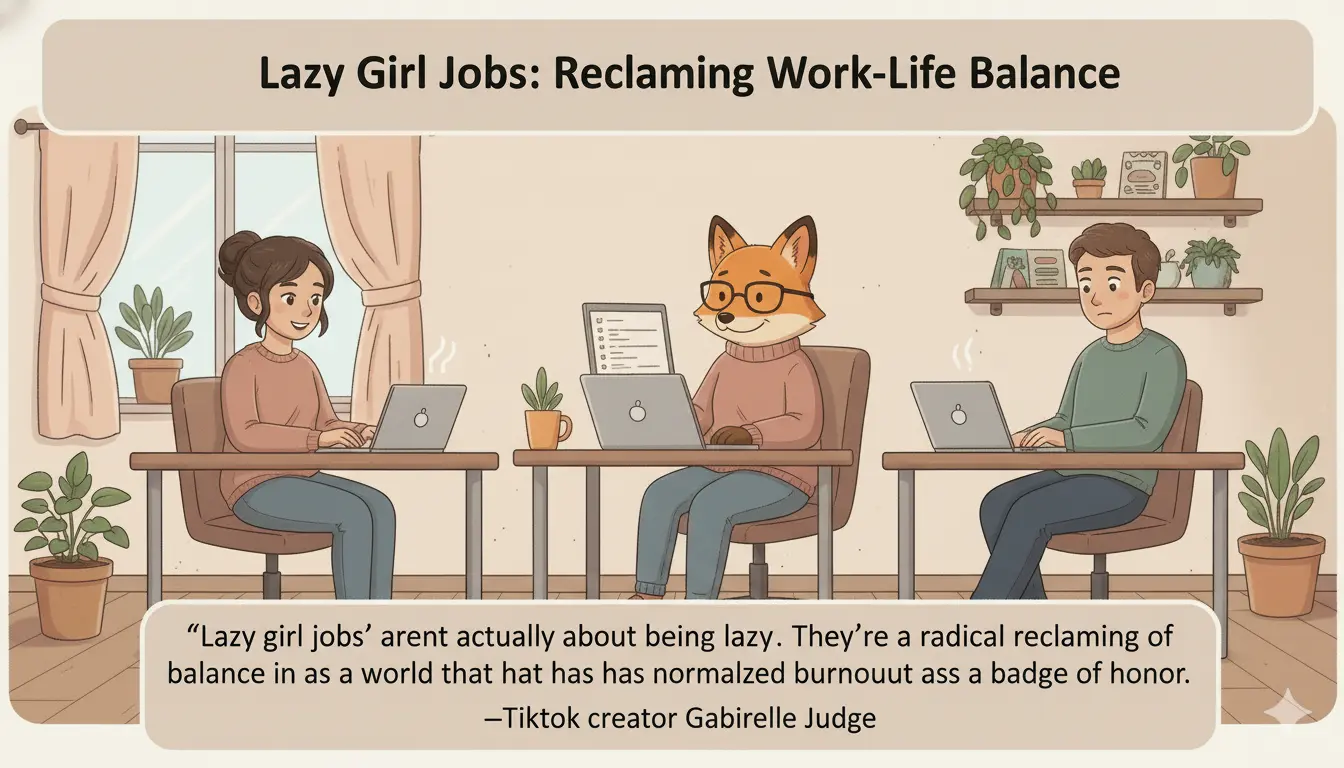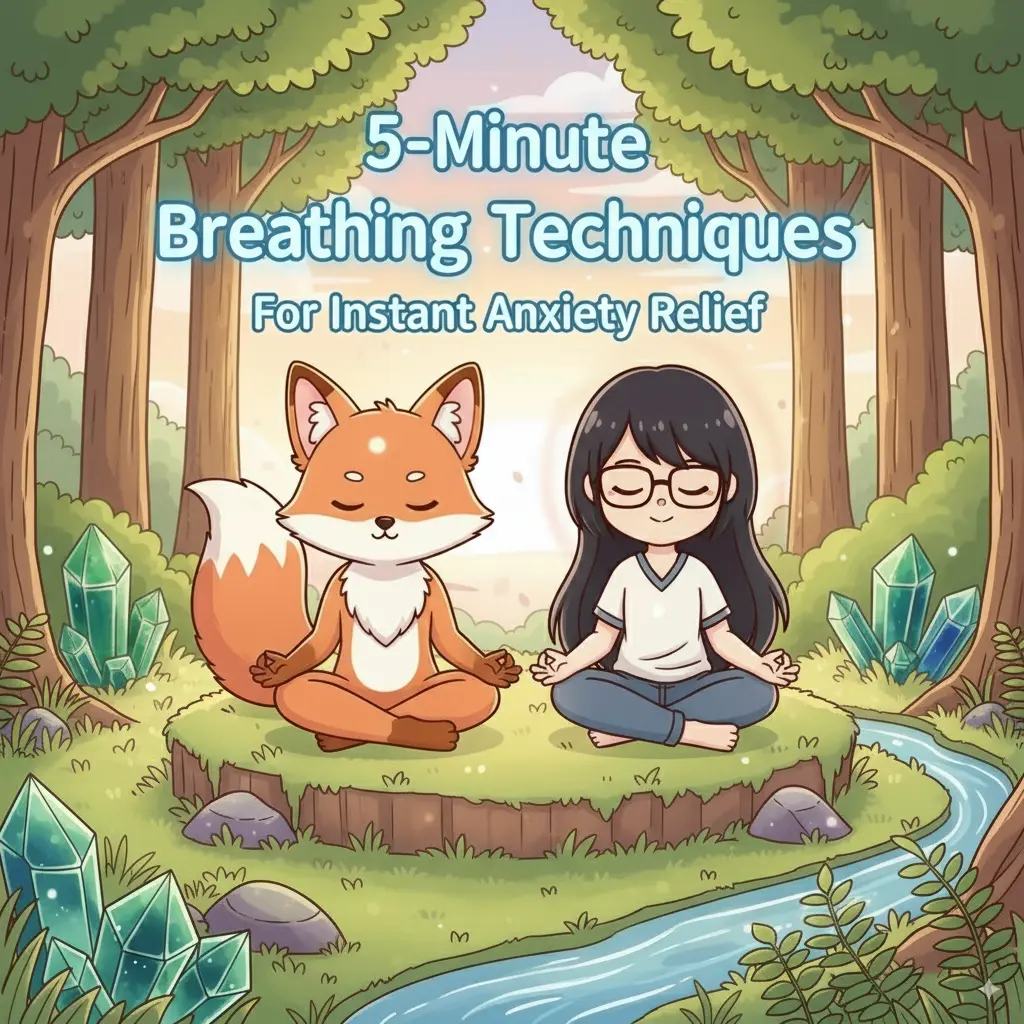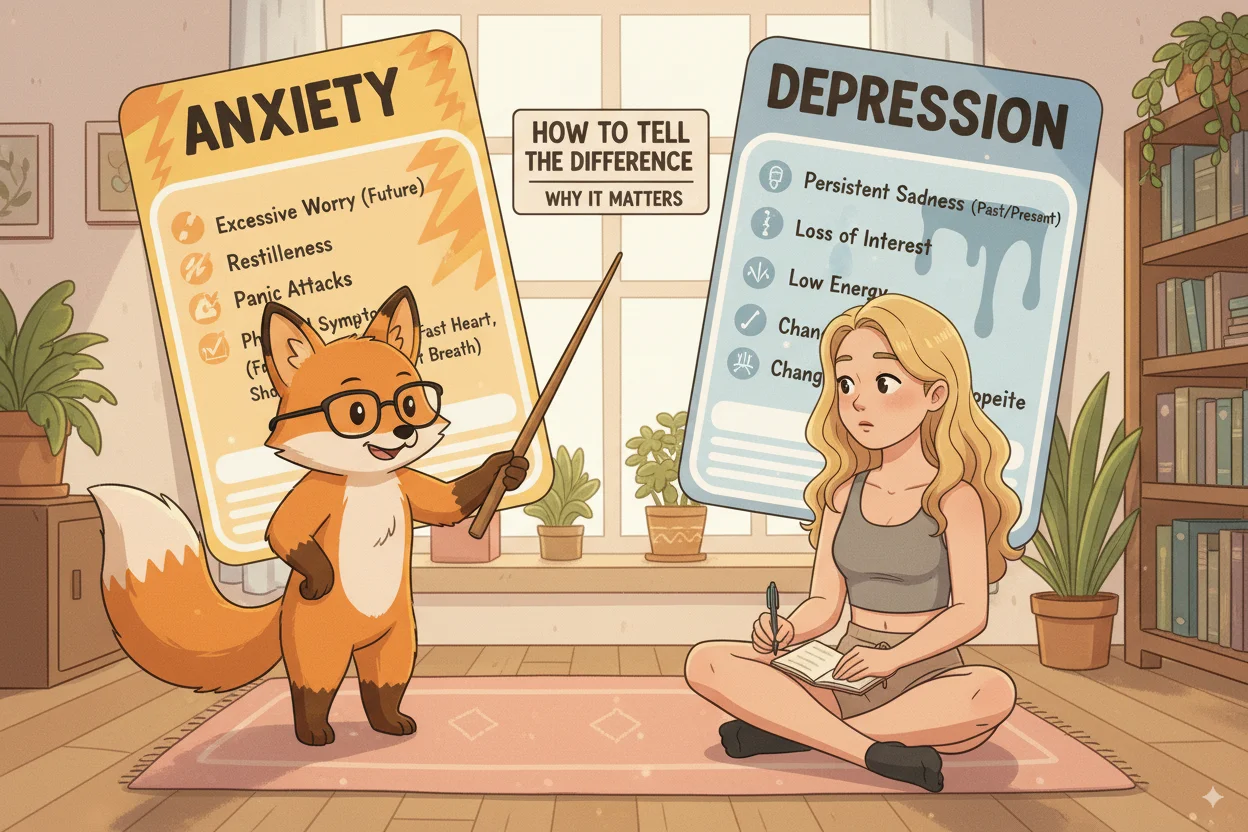
Lazy Girl Jobs and Mental Health: Redefining Success Beyond Hustle Culture
Discover the Lazy Girl Jobs movement challenging hustle culture, with practical advice for finding low-stress, sustainable careers that prioritize mental health and work-life balance in Australia.
Lazy Girl Jobs and Mental Health: Redefining Success Beyond Hustle Culture
curls up with a cozy blanket and warm tea, ready to chat about sustainable work 🦊💕
Introduction: The Quiet Revolution Against Hustle Culture
Imagine waking up on a Monday morning without that familiar knot in your stomach. You check your phone—no urgent emails, no weekend work spillover, just a reasonable to-do list waiting for you at 9 AM. Your job pays decently, respects your boundaries, and most importantly, doesn't drain every ounce of your life force by Friday afternoon.
This isn't a fantasy. It's the essence of what TikTok creator Gabrielle Judge has coined as "lazy girl jobs"—a viral movement that's resonating deeply with Gen Z and Millennials who've watched their parents sacrifice everything for corporate loyalty that no longer exists.
Despite the provocative name, lazy girl jobs aren't actually about being lazy. They're a radical reclaiming of work-life balance in a world that has normalized burnout as a badge of honor. These are roles that pay reasonably well (typically $60,000-$80,000 annually in Australia), offer genuine flexibility, and don't require you to answer Slack messages at 10 PM or sacrifice your mental health at the altar of productivity.
As burnout rates continue to climb—particularly among younger workers navigating an increasingly uncertain economic landscape—the lazy girl jobs movement represents something deeper than a trend. It's a collective boundary-setting exercise, a pushback against toxic productivity culture, and a reimagining of what success can look like when we stop equating our worth with our exhaustion.
What "Lazy Girl Jobs" Really Means
Let's clear something up immediately: "lazy girl jobs" is an intentionally provocative term designed to challenge our collective obsession with hustle culture. These roles aren't for people who want to do nothing—they're for people who want to do meaningful work without destroying themselves in the process.
The Core Principles
At their heart, lazy girl jobs embody a few non-negotiable principles:
Work-from-home flexibility: The ability to control your environment, eliminate soul-crushing commutes, and integrate work into your life rather than sacrificing your life for work.
Reasonable working hours: Jobs that respect the 38-hour workweek (Australia's standard full-time hours) without the expectation of constant overtime or weekend availability.
Clear boundaries: Roles where "urgent" actually means urgent, not just someone else's poor planning becoming your emergency.
Fair compensation for effort: Salaries that reflect the work required without demanding you give 110% of yourself every single day. The sweet spot typically falls between $60,000-$80,000 in the Australian market—enough to live comfortably without the pressure that comes with high-stakes corporate positions.
Sustainable workload: Tasks that can actually be completed within work hours, allowing you to fully disconnect when you clock off.
Strategic Energy Management, Not Laziness
What hustle culture calls "lazy," sustainable work advocates call "strategic energy management." There's a profound difference between being unambitious and recognizing that your energy is a finite resource that deserves to be allocated thoughtfully.
Consider this reframing: Instead of asking "How much can I produce?" a lazy girl job approach asks "How can I produce value while maintaining my wellbeing?" Instead of "How high can I climb?" it asks "What level of professional achievement allows me to also have a rich personal life?"
This isn't about lacking drive. Many people in lazy girl jobs are deeply ambitious—they're just ambitious about different things. They want time to pursue creative projects, care for loved ones, travel, learn new skills, or simply rest without guilt. They've rejected the false narrative that productivity is the only measure of a life well-lived.
The Difference Between Sustainable Work and Settling
Critics of the lazy girl jobs movement often conflate boundary-setting with lack of ambition. But there's a crucial distinction between sustainable work and simply settling for less than you deserve.
Sustainable work means:
- Choosing roles that align with your values
- Setting boundaries that protect your mental health
- Pursuing growth at a pace that doesn't compromise wellbeing
- Defining success on your own terms rather than society's metrics
Settling means:
- Accepting poor treatment because you don't think you deserve better
- Staying in unfulfilling roles out of fear rather than choice
- Suppressing your authentic needs and desires
- Allowing others to define your worth
The lazy girl jobs movement isn't about lowering your standards—it's about raising them to include your humanity alongside your productivity.
The Mental Health Case for Sustainable Work
The connection between overwork and mental health deterioration isn't just anecdotal—it's extensively documented. Australia's workplace culture, despite our reputation for laid-back living, increasingly mirrors the burnout epidemic seen globally.
The Burnout Epidemic
According to Safe Work Australia, work-related mental health conditions account for a significant and growing portion of workers' compensation claims. The Australian Psychological Society's annual surveys consistently show that work remains one of the top sources of stress for Australians, with issues like job security, workload, and work-life balance topping the list of concerns.
The World Health Organization officially recognized burnout as an "occupational phenomenon" in 2019, defining it as a syndrome resulting from chronic workplace stress that hasn't been successfully managed. The three dimensions—exhaustion, mental distance from one's job, and reduced professional efficacy—perfectly describe what happens when we push ourselves too hard for too long without adequate recovery.
Young workers are particularly vulnerable. Many entered the workforce during or shortly after the Global Financial Crisis, graduating into precarious employment markets where "paying your dues" often meant accepting exploitation as normal. The pandemic then normalized working from home—which should have been liberating—but instead blurred boundaries even further, with many people reporting longer hours and increased expectations when working remotely.
The Physical Toll of Chronic Stress
When we discuss low-stress jobs, we're not just talking about avoiding annoyance or frustration. Chronic workplace stress creates measurable physiological changes:
- Elevated cortisol levels that suppress immune function
- Increased risk of cardiovascular disease
- Sleep disruption and its cascading health effects
- Digestive issues and inflammation
- Heightened anxiety and depression risk
The Australian Bureau of Statistics' data on health conditions shows concerning trends in mental health issues among working-age Australians, particularly those in high-pressure industries. The connection between workplace demands and deteriorating mental health isn't controversial—it's simply reality.
Lazy Girl Jobs as Preventative Mental Health Strategy
Here's where the lazy girl jobs movement becomes genuinely radical: it reframes work choices as health choices.
Instead of waiting until you're burnt out, on stress leave, or having panic attacks before Sunday shifts, the lazy girl approach asks: What if we prevented burnout before it started?
What if choosing a sustainable job wasn't seen as "giving up" but as "showing up" for your long-term wellbeing?
This preventative approach makes both health and economic sense. The cost of treating burnout, anxiety, and depression—both personally and to the healthcare system—far exceeds the potential "lost earnings" from choosing a lower-pressure role.
Moreover, sustainable work often leads to better long-term outcomes. When you're not constantly depleted, you have energy for professional development, skill-building, networking, and strategic career moves. You can actually think about your future instead of just surviving each week.
Challenging Toxic Productivity Narratives
Hustle culture sold us a seductive lie: that more effort always equals better results, that rest is something you earn only after achieving enough, that your worth is measured by your output.
The lazy girl jobs movement calls out this narrative for what it is—toxic, unsustainable, and often rooted in exploitation rather than empowerment.
When we celebrate the "rise and grind" mindset, we're often celebrating people burning themselves out to make someone else wealthy. When we shame people for wanting reasonable work hours, we're upholding systems that benefit from our exhaustion.
Choosing a low-stress job isn't a personal failing. It's a refusal to participate in a system that treats human beings as resources to be extracted until depleted.
15 Examples of Sustainable Careers (Australian Context)
If you're ready to explore lazy girl job territory, here are 15 career paths that typically offer better work-life balance, reasonable stress levels, and genuine flexibility. All salary ranges are approximate based on Australian market data and will vary based on experience, location, and specific employer.
Remote-Friendly Roles
1. Virtual Assistant Remote administrative support for businesses or executives, handling scheduling, email management, and coordination tasks.
- Typical salary: $50,000-$65,000
- Why it qualifies: Work-from-home flexibility, clear task boundaries, ability to manage multiple clients at set hours
2. Content Coordinator Managing content calendars, scheduling social media posts, and coordinating between writers, designers, and stakeholders.
- Typical salary: $60,000-$75,000
- Why it qualifies: Creative but not high-stakes, flexible hours, remote-friendly, clear deliverables
3. Data Entry Specialist Accurate input and management of information in databases and systems.
- Typical salary: $50,000-$60,000
- Why it qualifies: Clear tasks, minimal decision fatigue, remote options, predictable hours
4. Customer Success Coordinator Supporting existing customers with onboarding, troubleshooting, and relationship maintenance (not high-pressure sales).
- Typical salary: $60,000-$70,000
- Why it qualifies: Relationship-focused rather than target-driven, scheduled support hours, remote capability
5. Bookkeeper Managing financial records, invoicing, and basic accounting for small-to-medium businesses.
- Typical salary: $55,000-$70,000
- Why it qualifies: Clear systems and processes, work-from-home friendly, seasonal variations allow planning
6. Executive Assistant (Non-Executive Level) Supporting mid-level managers with administrative tasks, calendar management, and project coordination.
- Typical salary: $65,000-$80,000
- Why it qualifies: Defined scope, benefits from manager's boundaries, organisational rather than strategic pressure
Government and Public Sector
7. Administrative Officer (Local, State, or Federal Government) Processing applications, managing records, and supporting various government functions.
- Typical salary: $60,000-$75,000
- Why it qualifies: Strong work-life balance culture, clear leave entitlements, defined hours, job security
8. Library Assistant or Librarian Supporting public or academic libraries with collection management, customer service, and programming.
- Typical salary: $55,000-$70,000
- Why it qualifies: Community-focused, predictable schedules, quieter work environment, cultural respect for reading and learning
9. Policy or Research Assistant Supporting policy development or research projects in government or public sector organizations.
- Typical salary: $65,000-$80,000
- Why it qualifies: Intellectual work without corporate pressure, reasonable deadlines, mission-driven environments
Education Support
10. Education Assistant or Teacher's Aide Supporting teachers in primary or secondary schools with classroom management and student support.
- Typical salary: $50,000-$60,000
- Why it qualifies: School hours alignment, meaningful work, school holiday breaks, clear role boundaries
11. Student Services Officer (University/TAFE) Advising students on enrollment, course selection, and administrative matters.
- Typical salary: $60,000-$70,000
- Why it qualifies: Academic calendar rhythm, student-focused rather than profit-driven, supportive environment
Non-Profit and Community Sector
12. Program Coordinator (Non-Profit) Managing community programs, volunteer coordination, and stakeholder engagement for mission-driven organizations.
- Typical salary: $60,000-$75,000
- Why it qualifies: Purpose-driven work, often better work-life balance than corporate, values-aligned culture
13. Grants Administrator Managing grant applications, reporting, and compliance for non-profits or community organizations.
- Typical salary: $65,000-$75,000
- Why it qualifies: Clear deadlines and processes, meaningful impact, less competitive pressure
Flexible Corporate Roles
14. User Experience (UX) Researcher (Junior to Mid-Level) Conducting user research, usability testing, and gathering insights to improve products and services.
- Typical salary: $70,000-$85,000
- Why it qualifies: Project-based rather than constant crunch, research-focused reduces decision fatigue, growing field with opportunities
15. HR Coordinator or Advisor Supporting human resources functions like recruitment, onboarding, and employee relations.
- Typical salary: $60,000-$75,000
- Why it qualifies: People-focused rather than profit-maximization, structured processes, supportive role
A Note on Salary Data
These salary ranges are estimates based on advertised positions on Australian job sites like SEEK and Indeed, as well as general market knowledge. Your actual salary will depend on:
- Your specific location (capital cities typically pay more)
- Your experience level and qualifications
- The organization's size and funding
- Your negotiation skills
- Industry-specific variations
The key point isn't the exact number—it's that these roles typically offer fair compensation without requiring you to sacrifice your wellbeing to earn it.
How to Transition to a Lazy Girl Job
If you're feeling called to make a change, here's how to thoughtfully transition toward more sustainable work.
Step 1: Identify Your Non-Negotiables
Before you start job hunting, get crystal clear on what actually matters to you. These might include:
Boundary-related non-negotiables:
- No weekend or after-hours work expectations
- Flexible start/finish times
- Work-from-home options (full-time, hybrid, or occasional)
- Defined on-call or availability expectations
Compensation non-negotiables:
- Minimum acceptable salary (be realistic about your financial needs)
- Superannuation contributions at the legal minimum or better
- Leave entitlements (personal leave, annual leave, parental leave)
- Professional development budget
Culture and values non-negotiables:
- Management style and communication preferences
- Company values alignment
- Team size and collaboration expectations
- Growth opportunities (or lack thereof—it's okay to prioritize stability!)
Writing these down helps you filter opportunities efficiently and prevents you from talking yourself into roles that don't actually serve you.
Step 2: Research Potential Employers
Not all companies claiming "work-life balance" actually practice it. Do your homework:
Check Glassdoor and other review sites: Look for patterns in employee reviews, particularly around management, work-life balance, and culture.
Investigate their social media presence: How do they talk about employees? Do they celebrate overwork or genuine achievement? Are they performatively "cool" or authentically supportive?
Look for B Corp certification or ethical employer awards: While not guarantees, these often indicate more thoughtful organizational cultures.
Research turnover rates: High employee turnover often signals toxic workplace culture, even if the job description sounds perfect.
Step 3: Master the Interview Process
Traditional interview advice tells you to demonstrate passion and commitment. Lazy girl job interviewing requires a different approach: mutual evaluation.
Questions to ask about work-life balance:
- "Can you walk me through a typical week in this role?"
- "What are the expectations around availability outside standard hours?"
- "How does the team handle urgent requests or tight deadlines?"
- "What does work-from-home look like in practice here?"
- "Can you tell me about the last time someone on your team took their full annual leave?"
Red flags to watch for:
- Vague answers about hours ("We work until the job is done")
- Glorification of overwork ("Our team is really passionate—they're always available!")
- Unclear boundaries ("We're like a family here")
- Resistance to work-from-home flexibility without legitimate reasons
- High turnover with unconvincing explanations
Green flags to look for:
- Specific examples of work-life balance in practice
- Clear communication about expectations and boundaries
- Genuine enthusiasm about the team's wellbeing
- Transparent discussion of challenges without crisis framing
- Interviewers who respect your time and availability
Step 4: Navigate the Australian Job Market Strategically
LinkedIn: Optimize your profile with keywords related to your target roles. Set your status to "Open to Work" but specify preferences (remote, part-time, specific industries).
SEEK: Australia's largest job site. Use filters effectively—search for "work from home," "flexible hours," and specific industries known for better balance (government, non-profit, education).
Ethical Jobs: Specializes in non-profit and purpose-driven organizations, which often align better with lazy girl job principles.
Government job boards: Each state has official job sites for public sector roles (e.g., I Work for NSW, Jobs Victoria), which typically offer excellent work-life balance and clear conditions.
Industry-specific sites: Depending on your field, niche job boards may have better quality listings with more detailed role information.
Network intentionally: Join LinkedIn groups, attend industry events, and connect with people in roles or companies you admire. Many lazy girl jobs aren't advertised publicly—they're filled through networks.
Step 5: Make the Transition Financially Sustainable
If you're currently in a high-stress role and considering a transition that might involve a pay cut, plan carefully:
- Build an emergency fund to reduce financial pressure during job searching
- Calculate your actual minimum income needs (not wants—needs)
- Research salary ranges thoroughly so you know what's reasonable to expect
- Consider part-time or contract work as a bridge if needed
- Explore government support if you'll have gaps between roles (JobSeeker, training programs)
- Don't quit impulsively—plan strategically while still employed if possible
Addressing the Criticism: Is This Movement Problematic?
No conversation about lazy girl jobs would be complete without addressing the legitimate critiques this movement has received.
"What About Ambition?"
Perhaps the most common pushback: Isn't this settling? What about pursuing excellence and achieving your potential?
Here's the thing—ambition isn't a monolith. Hustle culture has narrowed our definition of ambition to mean "constantly striving for more status, money, and recognition in your career." But ambition can take many forms:
- Ambition to be a present, engaged parent
- Ambition to create art, music, or writing outside of work
- Ambition to build deep, meaningful relationships
- Ambition to contribute to your community
- Ambition to live sustainably and ethically
- Ambition to maintain your mental health and wellbeing
The lazy girl jobs movement doesn't reject ambition—it rejects the idea that career ambition should automatically supersede all other life ambitions.
Moreover, there's nothing ambitious about burning yourself out by 35 and spending the next decade recovering. Strategic sustainability is actually the more ambitious long-term play.
"Isn't This Privileged?"
Yes and no. This criticism deserves serious consideration.
The privilege aspect is real: Being able to choose a lower-stress job that pays $60,000-$70,000 instead of pushing for $100,000+ requires a certain level of financial security. If you're supporting family members, managing significant debt, or living in an expensive city without support, the "choice" to prioritize wellbeing over income may not exist.
However, the critique can also be weaponized to maintain exploitative systems. Just because not everyone can immediately access sustainable work doesn't mean we should stop advocating for it or shame those who pursue it.
A more productive framing: The lazy girl jobs movement should be the floor, not the ceiling. Everyone deserves work that pays fairly without destroying their health. The fact that this isn't currently accessible to everyone is an indictment of our economic system, not of people trying to protect their wellbeing.
The movement becomes problematic when it's presented as a complete solution rather than one strategy within a larger fight for workers' rights, living wages, and universal support systems that give everyone genuine choices.
Generational Differences and the Changing Social Contract
Much of the friction around lazy girl jobs stems from generational divides in work expectations.
Older generations often entered workforces with different social contracts: Work hard, stay loyal to a company, and receive job security, pensions, and steady career progression in return. For many in these generations, that contract actually held up (though often at enormous personal cost).
Younger workers entered a fundamentally different landscape: Precarious employment, stagnant wages despite rising productivity, pension systems they don't trust will exist when they retire, and companies that shed employees the moment it benefits the bottom line.
When the old social contract broke down—when companies stopped valuing loyalty and security in favor of flexibility and profit maximization—younger workers responded by prioritizing their own wellbeing over company loyalty.
The lazy girl jobs movement isn't about young people being entitled or lazy. It's about adapting to economic realities and refusing to sacrifice everything for employers who've already demonstrated they won't reciprocate that commitment.
Reclaiming Rest as Productive
Perhaps the most profound shift the lazy girl jobs movement offers is reframing rest not as something you earn after productivity, but as essential to human wellbeing regardless of economic output.
Capitalism conditions us to measure our worth by our productivity. The lazy girl jobs movement challenges this at its core: You have inherent worth that exists completely independently of your economic productivity.
Rest isn't laziness. Recovery isn't weakness. Choosing a sustainable pace isn't settling.
These are radical acts of self-respect in a culture that profits from your exhaustion.
Healing Through Work-Life Realignment
If you're considering a transition to more sustainable work, the journey itself can be part of your healing process.
At SisiTheFox, we understand that career decisions are deeply intertwined with mental health and overall wellbeing. Changing how you work isn't just about finding a new job—it's about reimagining your relationship with productivity, worth, and rest.
Workplace Wellbeing Journey: Our comprehensive 21-day program supports you through career transitions, helping you identify your boundaries, communicate your needs, and build resilience during the job search process. It includes guided reflections, boundary-setting exercises, and strategies for managing the emotional complexity of leaving familiar roles—even unhealthy ones.
Fox Healing Essential Pack: Managing job search anxiety and career uncertainty takes a toll. This foundational healing resource offers daily practices for grounding, emotional regulation, and maintaining perspective during transitions.
Half-Year Healing Companion: Career transitions rarely happen overnight. This six-month tracking and reflection tool helps you stay connected to your progress, celebrate small wins, and maintain your commitment to sustainable work even when external pressure pushes you toward old patterns.
Remember: Choosing a lazy girl job isn't giving up on your potential. It's honoring your humanity. It's recognizing that you are more than your output, that your wellbeing matters, and that success can look like waking up on Monday mornings without dread.
Conclusion: Your Worth Isn't Your Work
The lazy girl jobs movement has struck a nerve because it articulates what so many people feel but struggle to voice: We're tired. We're tired of sacrificing our health, our relationships, and our joy for jobs that would replace us before our obituaries were written.
We're tired of being told that wanting reasonable work hours and genuine boundaries makes us entitled or uncommitted.
We're tired of a culture that celebrates exhaustion and pathologizes rest.
Choosing a low-stress, sustainable job isn't a compromise—it's a declaration that your life belongs to you, not to your employer. It's a commitment to being a whole person, not just a productive unit.
As you consider your own career path, remember this: The goal isn't to find the perfect "lazy girl job" that magically solves all your problems. The goal is to choose work that supports your wellbeing rather than depleting it, that allows you to be ambitious about your whole life, and that respects your fundamental humanity.
You deserve work that doesn't require you to split yourself in half—professional self at the office, authentic self everywhere else. You deserve work that pays fairly without demanding your soul as collateral.
Your worth isn't your work. Your productivity isn't your value. Your rest isn't something you have to earn.
And choosing a job that honors these truths isn't lazy—it's one of the most courageous, boundary-setting, self-respecting decisions you can make.
Ready to explore career transitions that honor your mental health? Discover SisiTheFox's Workplace Wellbeing resources designed specifically for navigating sustainable work paths. 🦊💕
Did this article help you on your healing journey? I'd love to hear from you!
Send Sisi a Message

